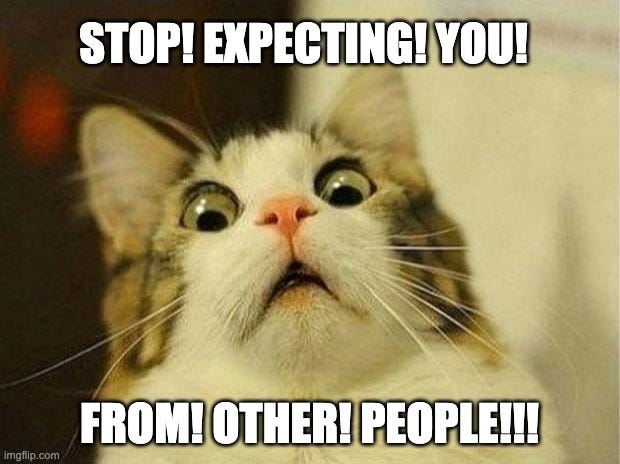Stop expecting you from other people
Sometimes the simplest advice hits hardest because it cuts through our intellectual defences.
I don’t remember where I saw it—a pixelated image of a shocked cat with these words in bold letters: “Stop expecting you from other people.”
It didn’t strike me immediately, but a few hours later when I went for a walk without my headphones. I don’t know why the picture stayed with me, but it did, and throughout my evening walk, I thought about nothing else. How I only expect myself from others—my reactions, my effort, my care. How I’m aware that we all have our different perspectives, different backgrounds and biases. How so many of my closest friendships have now been long distance for so long, and maybe always will be that way. How I’ll now only know my closest friends through texts and voice notes and shared memes and video calls and that just has to be enough. And at the same time, how despite knowing this, I have no idea how to expect anything else from anyone.
I remember coming across the YouTube channel Dictionary of Obscure Sorrows a few years ago. The beautiful compendium of invented words by creator John Koenig aims to fill holes in language—to give a name to emotions we all feel but don't have a word for.
“Sonder” means the feeling of realising that everyone around you has a life as complex and vivid as your own, filled with their own unique stories, ambitions, and worries. It suggests an awareness that every person is the main character in their own story, even if they are just a stranger passing by in yours.
This automatically made me want to be kind to everyone around me, the server behind a counter, the plumber who comes to fix my washing machine, the India Post clerk who patiently types out all the addresses of all the magazines I ship out. I have no idea what they’re going through, what their daily struggles entail.
But somehow the awareness about the people closest to us does not come so naturally and immediately. As much as I would like to believe otherwise, I might have no idea what is going on in the mind and lives of my close friends, and my family. It really struck me how I took the rich and complex inner worlds of my loved ones for granted.
It is hard to not have any expectations from loved ones. I want them to react to things a certain way when I'm sharing good news, I want them to say what I would like to hear when I am trying to be vulnerable and honest about why I am sad. While going through my loss-of-passion crisis, I remember feeling particularly distant from those who offered solutions instead of simply asking me how I was feeling. But I realise I don't always have the vocabulary to express what I'd like, so I withdraw and hope someone else will bring it up. I don't want to seem needy. All I want is to feel seen. When it happens, it is the most beautiful feeling. And when it doesn't…it makes me want to vanish.
Self-reflection can tip into narcissism, I suppose. I’ve been jokingly told this focus on ‘me, me, me’ could be because I’m the younger sibling and have always been coddled and pampered. I laughed it off as it was intended in the conversation, but lately I’ve been wondering if what I am doing is genuine introspection or well-disguised self-obsession?

I wonder how many times I disappoint my family and friends by not giving them the reaction they would like? Maybe they’re carrying their own unspoken expectations of how I should respond, maybe they’re worried about saying the wrong thing too. When they tell me they will miss me when I move to a different city, I tell them they shouldn’t feel this way, and that I will keep visiting and vice versa, and it’ll be even better. When maybe all they want is for me to acknowledge their love and say “awwww, I will miss you too”. Or how I upset my husband by keeping him second guessing about what I want by being ambiguous in my response, and then shutting down when there is a conflict.
I suppose the only practical solution (that I have thought of so far) is to not act on expectation (“what I would like them to do”), instead act on communication instead. Just speak. If I need something, I must say it. That is my responsibility. Not to assume, not to resent the silence that follows what was never said out loud. I need to remind myself of this regularly, especially in my relationship with my friends because they’re the furthest away. But I know I will forget this again. I hate having to spell it all out, it feels so needy. I keep hoping there’s another way. There isn’t, other than vanishing of course.
Tomorrow when someone doesn’t respond to me the way I want them to, I’ll have to remind myself of that wise cat again.
